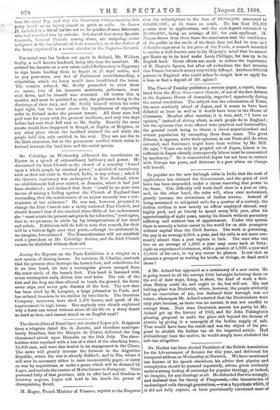So popular are the new furlough rules in India that
the rush of applications has alarmed the Government, and the grant of civil leave has been suspended, under a clause reserving that power to the State. This difficulty will work itself clear in a year or two, and, on the other hand, the rules will, when once understood, greatly increase the attractions of Indian service. Instead of being sentenced to mitigated exile for a quarter of a century, the Indian civilian is now merely an officer employed abroad, very highly paid, and at liberty-to spend every fifth year, after his apprenticeship of eight years, among his friends without pecuniary suffering and without loss of appointment. Under this system there is scarcely a better career in the world for an able youngster without capital than the Civil Service. The work is governing, the pay is an average 2,000/. a year, and the exile is not more con- stantly absent than a post captain in luck. The man who can live on an average of 1,200/. a year may come back at forty- eight an experienced statesman, with a pension of 1,000/. a year and 15,000/. of his own, to try any career he pleases. Is not that as pleasant a prospect as waiting for briefs, or livings, or dead men's shoes ?






























 Previous page
Previous page